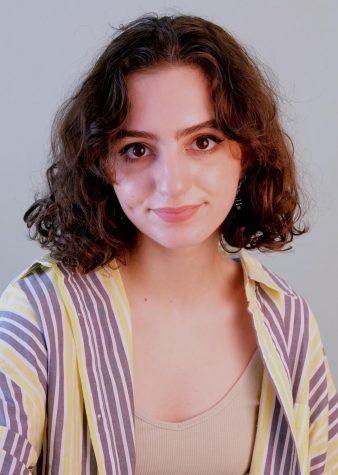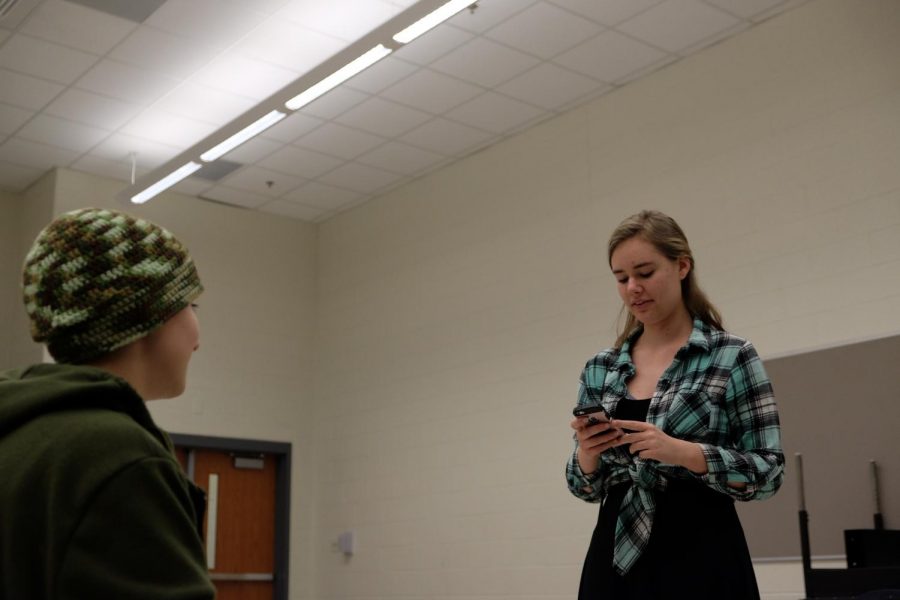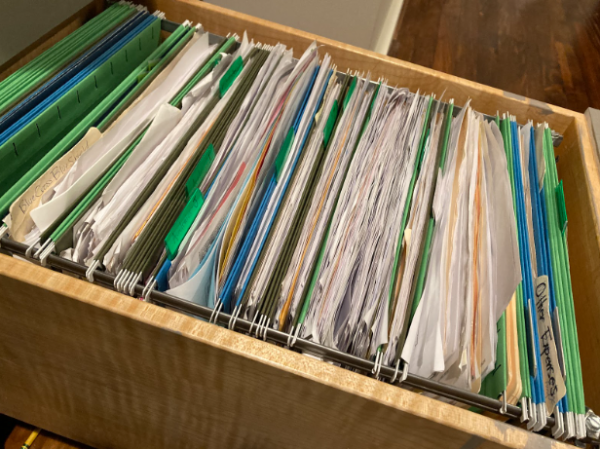Student Poets Take the Stage at 2019 Poetry Slam
Freshman Sirianna Blanck stands to share her poem.
After school on March 4, amidst the clusters of chairs in the multi-purpose room and aromas emerging from the snack table, stood a group of Chamblee students set to perform at the Literary Magazine’s 2019 poetry slam.
“The poetry slam is something we do every year where students come in and read their original poetry for the audience,” said Literary Magazine editor-in-chief and senior Isabel Bradford.
Hosted by language arts teachers and Literary Magazine sponsors Fred Avett and James Demer, the poetry slam is an annual competition open to all students that are looking to share a certain idea, story, or message in spoken-word format.
Chamblee’s poetry slam is structured in a way that ensures the simplicity of the process. Prior to the competition, attendants only need to worry about showing up and having a poem prepared if they plan to read.
“Everybody just kind of files in, and you just write down on the sheet if you’re going to be doing a poem,” said Bradford. “We take [the sheet] up and say, ‘Okay, this person, come up and read your poem.’ And then they come up and they’re like, ‘This is the title,’ and then they say their poem.”
After all poems have been read, winners are determined through a judging process.
“The judges, which are usually Mr. Avett and Mr. Demer […] give [the students] scores based on how well they think they did, and then we award prizes for first, second, and third place,” said Bradford. “I think there’s a rubric that Mr. Avett uses. I don’t know exactly what’s on it, but it’s [along the lines of] how well they connected with the audience, how well we could understand what they were saying. Just presentation and things like that.”
The only requirement of the poetry performed at the slam is that it needs to be spoken word, but the format of the event typically lends itself to slam poetry. Although not a specific genre of poetry, slam poetry is generally associated with a specific subject matter. It is not, however, limited to a specific theme, rhyme pattern or format like a sonnet would be, for example.
“Slam poetry seems to mostly be poems that people have written about their personal experiences or how they’re living, sort of like their situation mostly,” said Bradford. “But it can also really be about anything. It can be funny. Last year we had someone to a poem that was sort of like a joke. […] It can be really about anything, as long as it’s something you’re passionate about and that you go up and read it with enthusiasm. It’s just read out loud for other people.”
Despite being small in number, this year’s group of poets spoke about a variety of topics, their poems ranging from motivational to abstract. Freshman Camille Thorp’s poem, titled “A Toast to the Breakfast King” was just one of the poems read at the event.
“I really like toast, and I wanted other people to know how much I love toast, so maybe they can love it too,” said Thorp. “I wanted to use a lot of figurative language, similes, and metaphors to say my ideas.”
Freshman Sirianna Blanck’s poem, which had no title, pondered how much of a mark her absence would leave on the world.
“I’ve always wondered about what my day to day life looks like without me in it,” said Blanck. “It was midnight, and I couldn’t sleep, and so that was just kind of in my head. Then I forgot about it, but then I was looking at a calendar that said the poetry slam was in the next week. I suddenly remembered the poem I had [thought of] in the middle of the night, so I wrote it down.”
Junior and 2018 poetry slam winner Maya Torres brought the event to a close with her poem “Teen Angst (The Sequel),” a follow-up to “Teen Angst,” the poem she performed in 2018.
“I had a poem I was really passionate about last year, and I won with that poem,” said Torres. “This year, […] I didn’t actually know about [the slam] until the day of, so I kind of just scribbled out a poem in fifth period.”
This short notice did not stop Torres from participating in the slam, however.
“There’s a song that just came out. It’s called ‘You Might Find Yours.’ It’s by Tom Rosenthal, and I really liked the message of the song, so I wrote a poem with a similar message,” said Torres. “I’m really consumed by my thoughts all the time, and I don’t really take time to notice what’s going on around me. I wanted to write to tell people to not do that.”
It appears that “Teen Angst (The Sequel)” was a success. Torres kept her title as first place winner this year, with Blanck coming in second. Thorp was the third place winner.
“I would definitely say that a big part of [writing a slam poem] is the impact and making the audience feel or understand something that you have experienced,” said Bradford.
After a poet’s time on the stage comes to an end, the audience, rather than clapping, turns to snapping as a form of applause.
“We all snap because [the poems are] always really good,” said Bradford. “For some reason, at poetry slams, people tend to snap instead of clap. It’s just sort of a tradition.”
And the snaps are well deserved, Bradford says. She highlights the importance of a poetry slam’s influence in a community such as Chamblee.
“It’s an opportunity to share what you’ve written and worked on, and I think it’s also an opportunity for an audience to […] hear the diverse voices that we have at Chamblee,” said Bradford. “We have so many different people with different experiences and different ways that they write and different things they write about. […] Just sitting there and listening to all the different things people have to say is really interesting, and I feel like it helps you get a better sense what our community’s about.”
Your donation will support the student journalists of Chamblee High School Blue & Gold. Your contribution will allow us to print editions of our work and cover our annual website hosting costs. Currently, we are working to fund a Halloween satire edition.

Iris Tsouris is a senior and editor-in-chief of the Blue & Gold. Outside of the paper, you can find her giving out haircuts, designing T-shirts, and sampling fruit at the Buford Highway Farmers Market. In five years, she hopes to be caring for a herd of cattle while making art in an obscure Swiss village. This is her third year on the staff.






